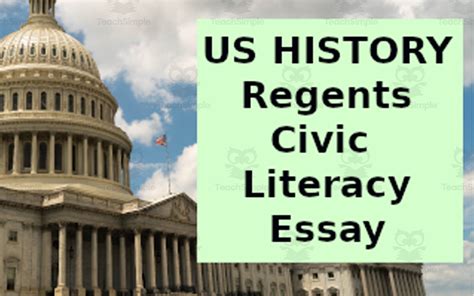Civic literacy is the ability to understand and engage with the political and social issues that affect one’s community and the world. It is a crucial component of democratic societies, as it enables citizens to make informed decisions about their government and participate in the civic process.

Importance of Civic Literacy
Civic literacy is essential for a well-informed and engaged citizenry. A civically literate person can:
- Understand the fundamental principles and structures of government
- Analyze and interpret political and social issues
- Engage in respectful and productive civic discourse
- Make informed decisions about public policy
- Participate effectively in the civic process
According to the Pew Research Center, “Americans who are highly civically literate are more likely to vote, volunteer, and participate in other forms of civic activity.” Furthermore, studies have shown that civic literacy is positively correlated with higher levels of educational attainment, income, and social capital.
Civic Literacy Essay Outline
A well-structured civic literacy essay will clearly present your understanding of a specific political or social issue. Here is a suggested essay outline:
I. Introduction
- Hook: Begin with a compelling statement or question that captures the reader’s attention.
- Thesis statement: Clearly state the main argument or claim of your essay.
- Background information: Provide context for the issue you are discussing, including relevant historical or political events.
II. Body Paragraphs
- Develop each body paragraph around a specific argument or point that supports your thesis statement.
- Use evidence from credible sources (e.g., government documents, academic journals, reputable news outlets) to support your claims.
- Analyze and interpret the evidence to demonstrate your understanding of the issue.
III. Counterargument
- Acknowledge and address opposing viewpoints or potential objections to your argument.
- Explain why you disagree with or find these alternative perspectives less convincing.
IV. Conclusion
- Restate your thesis statement, summarizing the main points of your essay.
- Provide a call to action, encouraging readers to engage with the issue or take a specific course of action.
- End with a thought-provoking statement or question that leaves a lasting impression on the reader.
Common Mistakes to Avoid
- Overgeneralization: Avoid making sweeping statements or drawing broad conclusions based on limited evidence.
- Biased language: Use objective and respectful language, even when discussing controversial issues.
- Logical fallacies: Ensure your arguments are based on sound logic and avoid using fallacies such as “ad hominem” or “straw man” arguments.
- Lack of evidence: Support your claims with credible evidence from reputable sources.
- Poor organization: Structure your essay in a logical manner and ensure there is a clear progression of ideas.
Civic Literacy in the Modern World
In the digital age, civic literacy has taken on new dimensions. Social media and the internet provide new opportunities for citizens to engage with political and social issues. However, they also present challenges, such as the spread of misinformation and the echo chamber effect.
To be effective civic actors in the modern world, citizens need to be able to:
- Navigate the digital information landscape: Critically evaluate online sources and distinguish between reliable information and propaganda.
- Engage in respectful online discourse: Express their views while respecting the opinions of others and avoiding personal attacks.
- Use digital tools for civic engagement: Utilize social media, online forums, and mobile apps to connect with other citizens and participate in civic initiatives.
Conclusion
Civic literacy is a vital skill for active and engaged citizens in a democratic society. By understanding the principles of government, analyzing political and social issues, and engaging in respectful discourse, citizens can make informed decisions and contribute to the health of their communities and the world.
